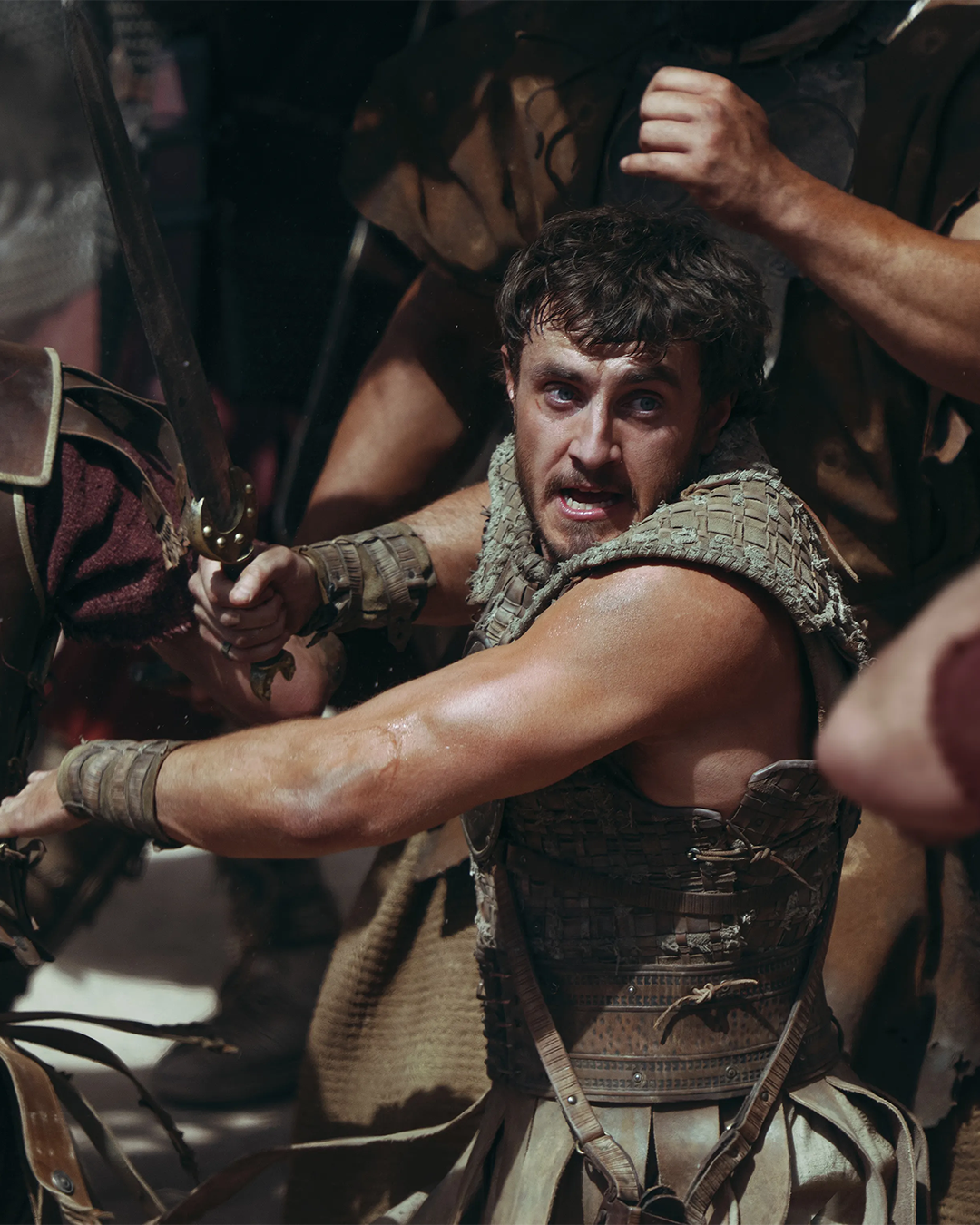
The dream of Rome according to "Gladiator 2" Paul Mescal is the heir of Russel Crowe in the blockbuster of the year
Though the myth of Rome has been told by Italy, it’s America that keeps it alive, partly through sequels. In 2019, Matteo Rovere and his production house, Groenlandia, attempted to make a modern epic, The First King, which told the story of Romulus and Remus, grounding the future founder of the capital, Alessandro Borghi, in dirt and mud. Yet, if you ask today who the real protagonist of the Roman legend is—aside from Francesco Totti dressed as a centurion, as seen at the recent Lucca Comics & Games—the answer remains the same after twenty-four years: Gladiator. Winner of five Oscars out of twelve nominations, Ridley Scott's masterpiece brought Russell Crowe to grasp the golden statue and established an unbreakable bond with Italy, from his passion for Lazio to his role as a priest on a Vespa in The Pope’s Exorcist. Despite the fact that the true icon of Rome in the world’s imagination, after the she-wolf, is a star from Wellington, New Zealand, it’s now time for Crowe to lay down his sword and make way for the stars of tomorrow—and for anyone who remembers the ending of Gladiator, they know there’s no other way.
Gladiator 2 is thus a (re)launching platform for a series of faces that the public already loves, but that will now step out of the niche of Millennials whose hearts were torn by Normal People or the D&D fans who loved (or hated) the fourth season of Stranger Things. From Paul Mescal to Joseph Quinn, without forgetting Pedro Pascal, who finally achieves cinematic stardom after making a name for himself in television with Game of Thrones and The Last of Us, this work is the epitome of Hollywood machismo. With an incredible cast that includes lesser-known (but talented) Fred Hechinger and veteran Denzel Washington (already in Oscar territory), the film thrives and radiates in all its glory. Whether or not it matches its predecessor’s success, Gladiator 2 is undeniably the blockbuster of the year, and a great comeback for Scott after the setbacks with House of Gucci and Napoleon.
The bridge connecting the first and second films is Lucius (Mescal), son of Lucilla and Maximus Decimus Meridius, and while Crowe can only return as a spirit in the sequel, Connie Nielsen reprises her role, this time alongside the general Acacius, played by Pascal. Raised far from Rome, long exhausted by the tyranny of emperors Geta (Quinn) and Caracalla (Hechinger), Lucius returns as a slave, striving to gain his freedom in the arena of the Colosseum. Amidst games and intrigues, however, he crosses paths with Macrinus (Washington), who has very different plans for him and for Rome. Shying away from some of the sentimentalism of the 2000 film, and the kind of pomposity that often coated dramas of the late ’90s and early 2000s, Gladiator 2 doesn’t avoid a walk through wheat fields, albeit sparingly placed, and knows that its strong point lies in muscular action and rhinoceroses. Combat is at the core of the scene from the outset: the Romans invading Numidian territories set the stage for the warlike soul of the work, where battle scenes and chaos far outweigh moments of human exchange. What’s lacking are connections. While the film leans heavily on entertainment, with fights and backstabbing as the true thrill for the audience, Gladiator 2 likely suffered from several cuts in editing, with Ridley Scott perhaps recalling the need to abbreviate his French epic, Napoleon, releasing only on AppleTV+ the full three-hour-and-forty-minute version.
Gladiator (2000) dir. Ridley Scott pic.twitter.com/EbtMHuSOr3
— cinesthetic. (@TheCinesthetic) November 10, 2024
Relationships in Gladiator 2 change too quickly; the second half has twists, surprises, and power-grabbing strategies that are unexpected and fast-paced. But it’s in realizing that this is fine—that a son and mother can reconcile with a single embrace, and two crazy emperor brothers need no further exploration—that it becomes clear that, in its own way, the film has hit its mark. At least, its own mark. It has revived the epic battles in the Colosseum, which at one point even turns into an artificial pool to stage a naval battle, spilled rivers of blood, and led the audience to a final monologue summing it all up: fight or die. And although it lacks the charisma of its predecessor, it is a worthy successor, with a lineup of new stars over whom Denzel Washington, like a conductor, orchestrates with flair (sometimes excessive, as theatrical as his recent Macbeth—still a master). The film does not retreat—not too much—into the depths of memory, nor into the past of the classic with Russell Crowe, but honors it with references to objects and musical cues that allow it to retain its identity without forgetting its roots. Just as happens with the passing of dreams from father to son, the dream of a free Rome is here passed down through strength and honor.














































